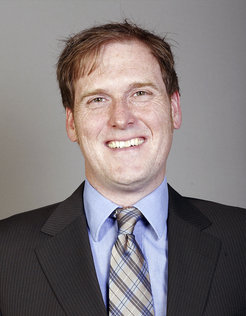Randolf Pohl receives Gustav Hertz Award of the DPG
He shares the prize with Dr. Aldo Antognini who was also in the team of Prof. Hänsch.
Dr. Randolf Pohl, scientist in the Laser Spectroscopy Division of Prof. Theodor W. Hänsch at the Max Planck Institute of Quantum Optics, is going to receive the Gustav Hertz Award of the German Physical Society (DPG). He shares the prize with Dr. Aldo Antognini who finished his doctoral thesis in the Laser Spectroscopy Division in 2005. The DPG award is given to young physicists in recognition for a recent scientific achievement, in order to encourage young physics students. Pohl and Antognini are presented with this prize for their new and unexpected determination of the proton radius in 2010.

Randolf Pohl studied physics at the Technical University in Munich where he received his diploma in 1997. He completed his doctoral thesis at the Swiss Federal Institute of Technology (ETH) in Zürich (Switzerland) in 2001. From 2001 to 2005 he was working as a post-doctoral researcher at the Paul-Scherrer-Institute (PSI) in Villigen (Switzerland). Since then, Dr. Pohl is a member of the Laser Spectroscopy Division of Professor Theodor W. Hänsch at the MPQ. Here he dedicates his research to the investigation of “muonic atoms” in which one of the electrons is replaced by the 200 times heavier muon. These experiments are carried out within a large international collaboration at PSI, of which Dr. Antognini (ETH) is a member, too.
In these exotic atoms the muons get so close to the nucleus – i.e. the proton –, that they literally “feel” its extension. However, the spectroscopic determination of the Lamb shift of the energy levels in muonic hydrogen in 2010 yielded a value for the proton radius which was significantly smaller than deduced from previous measurements – a fact that still puzzles the scientific community.
Only recently Dr. Pohl received the “European Research Council Starting Grant”. This will enable him to extend his measurements to muonic helium, measuring the size of its nucleus with tenfold precision. This will also shed some light on the proton size puzzle. Dr. Pohl is, together with Dr. Franz Kottmann from PSI, spokesperson of both the muonic hydrogen and the muonic helium collaboration. The Gustav Hertz Award – a certificate combined with a prize money of 7500 Euro – will be given to Randolf Pohl and Aldo Antognini on the occasion of the next spring conference of the German Physical Society, which will take place in Stuttgart in March 2012. Olivia Meyer-Streng
Contact:
Dr. Randolf Pohl
Max Planck Institute of Quantum Optics
Hans-Kopfermann-Str. 1, 85748 Garching, Germany
Phone: +49 (0)89/ 32 905 -281
E-mail: randolf.pohl@mpq.mpg.de
Dr. Olivia Meyer-Streng
Press & Public Relations
Max Planck Institute of Quantum Optics
Phone: +49 (0)89/ 32 905 -213
E-mail: olivia.meyer-streng@mpq.mpg.de
